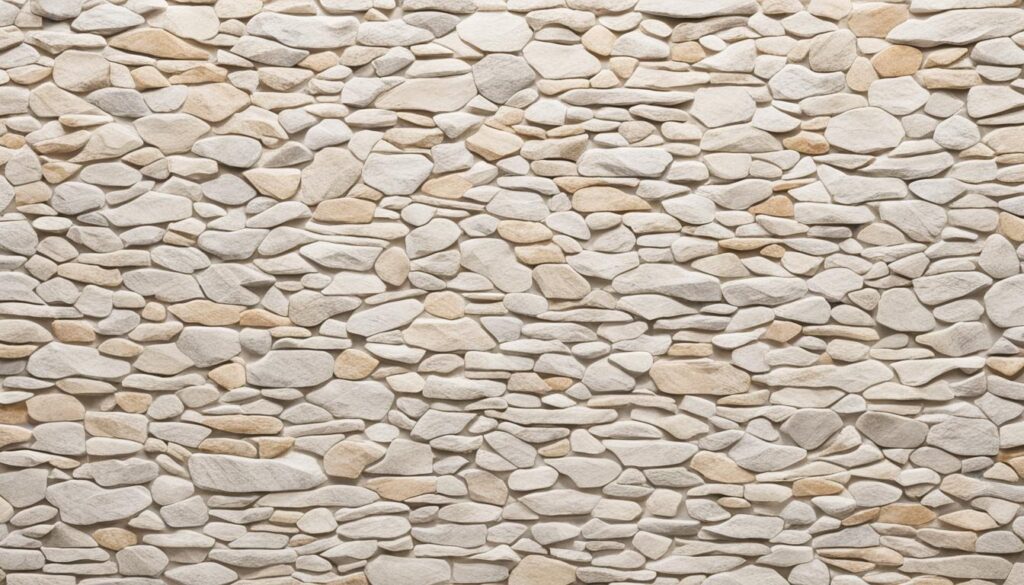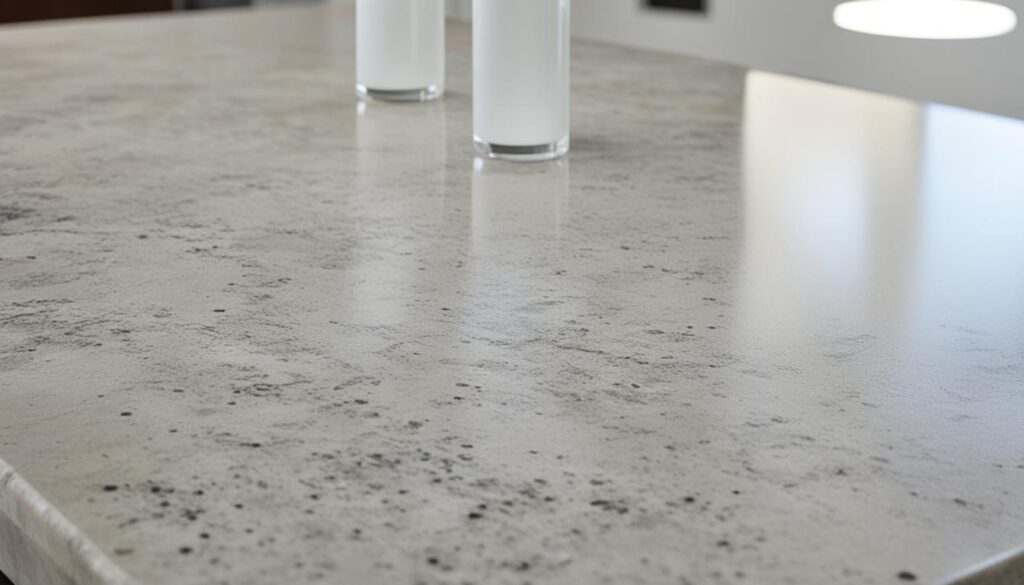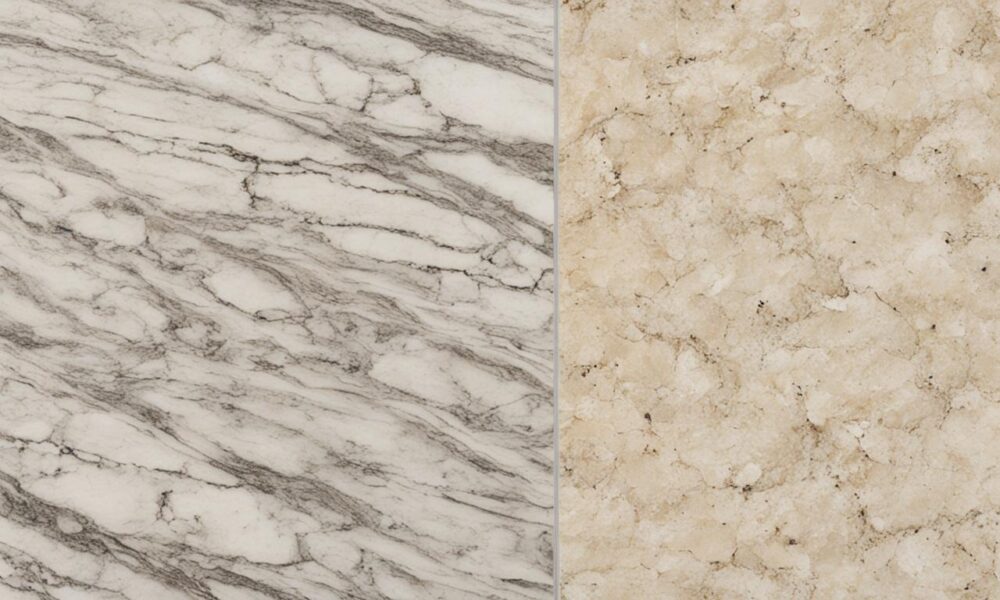Natural Stone vs. Engineered Stone: A Comparison
If you’re planning a kitchen remodel, choosing countertop materials is crucial. It changes how your space looks and works. Do you go for natural stone countertops or engineered stone countertops? Each option has pros and cons. They differ in strength, care needs, looks, and price. Your choice shapes your kitchen’s vibe and might affect your home’s future selling price.
Natural stones like granite, marble, and limestone have a classic, unmatched beauty. Engineered stone, however, offers a consistent look and is easier on the wallet. Understanding the differences helps you choose right. It depends on what style you like, how you’ll use it, and your budget.
Key Takeaways
- Natural stone countertops offer a one-of-a-kind appearance and can add to a home’s resale value.
- Engineered stone countertops provide uniform patterns and colors, fitting for modern design schemes.
- Durability varies across stone types, with granite being notably resilient and marble more susceptible to etching.
- Engineered stones such as quartz are built for easy maintenance and resistance to most kitchen hazards.
- Financial investment varies, as natural stones can be more premium while engineered stones are considered more cost-effective.
- Sustainability considerations are integral, with natural stone using finite resources and engineered stone offering a more eco-friendly footprint.
Introduction to Countertop Materials
Choosing countertop materials is a big decision for homeowners. The choice between natural stone vs. engineered stone affects the look and function of kitchens and bathrooms. It’s important to know the key differences and pros and cons of each option.
Natural stone countertops like granite, marble, and soapstone are known for their beauty. They have been forming for thousands of years. Each slab is unique, offering exclusive patterns and colors.
Engineered stone countertops, on the other hand, are known for uniformity and strength. They mix natural quartz with polymers to create consistent and sturdy slabs. Engineered stone can look very much like natural stone, which shows the skill of modern manufacturing.
The table below gives a clear comparison of natural stone vs. engineered stone based on several important features:
| Feature | Natural Stone | Engineered Stone |
|---|---|---|
| Unique Appearance | Each slab is unique | Consistent patterns |
| Durability | Depends on the type; generally durable if cared for properly | Very durable and more resistant to cracking |
| Maintenance | May need sealing from time to time | Easy to clean and maintain |
| Heat Resistance | Usually good, but it can vary | Can be harmed by heat |
| Eco-Friendliness | Comes from the earth, a limited resource | Often includes recycled materials |
The choice between natural and engineered stone depends on personal tastes and lifestyle needs. There are good arguments for both, focusing on looks, function, and eco-friendliness. When making such an important decision for your home, consider all the pros and cons of natural stone vs. engineered stone.
Natural Stone vs. Engineered Stone: Understanding the Essentials
When we look at countertop materials, we see two main types: natural and engineered stone. Each type has its own special traits and robustness that many people like. These features fit well with modern home design. Choosing the best surface for a countertop installation means learning where they come from and what they’re made of.
Defining Natural Stone and Its Origin
Natural stone comes from the earth, made over centuries. This long process gives each piece its own look and color, which varies depending on where it was found. Choices like granite and marble are classy but can be pricey. Others like soapstone and slate are more affordable but might need more upkeeping. This is something to think about when installing countertops.

Overview of Engineered Stone and Its Composition
Engineered stone is a blend of beauty and science. It mixes ground minerals with polymers to make a strong material. Products like quartz countertops offer lots of colors and styles. They are made in a way that allows for easy fixes and lots of design options.
| Natural Stone | Engineered Stone |
|---|---|
| Luxury aesthetic | Uniform appearance |
| Diverse textures and patterns | Consistent color palette |
| Requires periodic maintenance | Easy-care and replaceable |
| Color influenced by the quarry | Wide range of design choices |
The Aesthetic Differences: Beauty and Uniqueness
In the world of kitchen aesthetics, how countertops look is key. Different materials match different design tastes. You might love the unique patterns of natural stone or prefer the simple colors of a minimalist aesthetic.
Natural Stone’s Unique Charm
Natural stone stands out for its luxury and class. Those seeking a special design choose marble and granite. These materials are known for patterns that cannot be replicated, adding nature’s beauty to your home.
This brings an organic touch to contemporary design.
Engineered Stone’s Consistent Appearance
Engineered stone is for lovers of minimalist aesthetic. It’s known for color uniformity, providing a perfect background. This matches well with contemporary design and offers a consistent look.Material variations in engineered stone are predictable, which brings a sense of harmony to modern spaces.
| Feature | Natural Stone | Engineered Stone |
|---|---|---|
| Aesthetic | Exclusive, unique patterns | Uniform, consistent color |
| Suitability | Luxurious, timeless settings | Modern, minimalist environments |
| Design Integration | Complements classic elegance | Aligns with sleek, clean lines |
| Creative Expression | Nature-inspired, individuality | Planned symmetry, harmony |
Durability and Maintenance: Weighing the Pros and Cons
When looking at countertop longevity, homeowners compare natural stone to engineered stone. They wonder which one is best for scratch and heat resistance and easy-care surfaces. Granite is known for being tough. Yet, marble’s beauty comes with a price: it easily gets marked and needs regular sealing. Engineered stone, on the other hand, offers quality and low maintenance. It’s made to handle everyday use, making it great for those wanting durability and ease of care.

| Natural Stone | Engineered Stone |
|---|---|
| Higher scratch resistance in harder stones like granite | Uniform scratch resistance across slabs |
| May require resealing to maintain surface integrity | Typically no sealing needed; non-porous surfaces |
| Various levels of heat resistance; some may crack under high temperatures | Constructed for heat resilience but vulnerable to extreme temperatures |
| Longevity dependant on maintenance and care | Built for long-term performance with minimal upkeep |
To maximize the lifespan of countertops, know the care needs of what you pick. Be it natural or engineered, keeping it safe from harm means it will look good and last long.
Cost Implications: Budgeting for Your Kitchen Remodel
Starting a kitchen remodel often means finding a balance. You need to weigh affordability and investment value against each other. Choosing materials is a big part of this. While natural stones like marble offer beauty, they can be pricey. Engineered stones, on the other hand, are cost-effective alternatives.
Granite and marble countertops are seen as luxury items. They come with high investment value and class. Engineered stone gives you a similar upscale feel without the high cost. But, remember, the price of engineered stone can change. It depends on the brand, design, and material availability.
When thinking about costs, don’t just look at the price tag. Think about the long-term benefits too. Natural stone might be more expensive at first. But, it’s durable and can boost your home’s resale value. Engineered stone’s appeal comes from its lasting quality and easy care.
Here’s a table laying out the general cost comparisons:
| Material Type | Initial Cost | Maintenance Cost | Long-Term Investment Value |
|---|---|---|---|
| Natural Stone (e.g., Granite, Marble) | Higher | Moderate to High | High |
| Engineered Stone (e.g., Quartz) | More Economical | Low | Moderate to High |
Choosing wisely between affordability, lasting beauty, and value is key. By exploring cost-effective options and their long-term benefits, homeowners get smarter. This helps in planning the budget for a kitchen remodel better.
Eco-Friendly Considerations: Analyzing the Environmental Impact
In the world of interior design, how materials affect the environment is key. Looking at kitchen countertops, we think about their eco-footprint too. Natural stone is durable and needs little processing but uses lots of finite resources.
The process to get these stones involves a lot of quarrying. This step, plus the transport afterward, uses much energy and harms the environment.
Engineered stone is becoming more eco-friendly. It’s made from recycled materials, helping to cut waste and use less natural resources. This approach aims to reduce the need for new raw materials and lower the carbon footprint of manufacturing and distribution.
Choosing between natural and engineered stone impacts our planet. Engineered stone is a good option that meets design needs and supports sustainability. This choice is crucial as we all look for ways to use resources wisely and protect our future.



